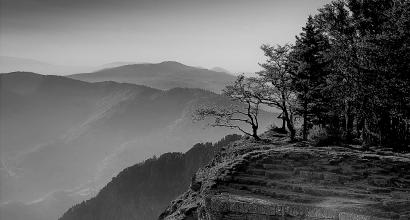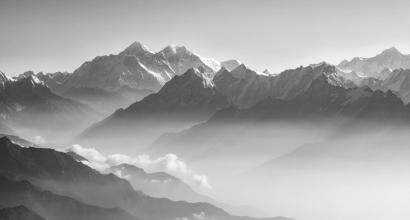There is a set of rules for the riders on the merry-go-round. The rider should proceed in his path and not collide with those ahead of him and those who follow him. Dharma is such a set of rules. If any of those rules is violated - say, the front rider does not leave way for the rider behind him or if a following rider drags the one ahead of him down - it is a sign that the rider has forgotten about the machine operator and that he has to be reminded of it. The behaviour of not troubling others is dharma. It is a kind of conduct. The Gītā itself has told us - “dhruvā nītiḥ”. Those who forget right conduct have to be reminded of it. The speed of the machine is maddening. Our body is inert, much like that wooden horse! It is paramātmā who causes the machine on which the jīvas are riding to whirl around. How? Through māyā.
When we visit the famous Channakeshava temple in Belur, we are so smitten by the exquisite sculptures of the stone-damsels around the temple that we return with no time to have darśana of the deity inside the garbha-gṛha. That is the māyā of the external beauty, and of erotic sentiment.
There seem to be two activities in Bhagavān’s līlā.
- Maddening us.
- Curing us of that madness.
He has maddened us by himself; he will cure us of it if we ask him to. Of what kind is that madness? It is the journey of the colourful merry-go-round. Prakṛti is that merry-go-round that has vividly colourful and brilliant elephants, horses, peacocks and swans. We forget that it is a game that we are playing. What started as a game becomes a violent passion. Just as Bhagavān instructed us before:
īśvaro’hamahaṃ bhogī siddho’haṃ balavān sukhī
(I am the lord, I am the enjoyer.
I am accomplished, strong and happy!)
Thus are we deluded. We saw earlier that māyā is a playful endeavour of prakṛti. It would be unfair to her if we said that this was the extent of her work. As much as prakṛti can delude us through māyā, she is still truthful. One of her hands shows the manifest truth while the other shows us untruth.
sacca tyaccābhavat |
Taittirīya Upaniṣat. 2.6.1
While one eye indicates treachery, the other points us to the truth. Trickery in one; cosmic truth in the other. The plant that sprouts according to the seed sown, offspring that resembles its parents, the arrangement of the five great elements according to their effects, the periodic cycle of seasons, the laws of motion of celestial objects, the hand that cooks food while the mouth consumes it - all these are the laws of ṛta[1] .
annādbhavanti bhūtāni parjanyādannasambhavaḥ |
evaṃ pravartitaṃ cakram ।BG 3.14
All these are effects of prakṛti’s ṛta.
ṛtaṃ satyaṃ paraṃ brahma
Mahānārāyaṇopaniṣad
The source of prakṛti is Brahma that is beyond it. One can transcend prakṛti by obeying the laws of ṛta and satya that form the beneficial aspect of prakṛti. Svāmi has said this already:
māmeva ye prapadyante māyāmetāṃ taranti te |
BG 7.14
It is Bhagavān who has created māyā. Therefore to cross māyā, one must surrender to Bhagavān while appealing to him - “Please withdraw your weapon of delusion”. He restates the same here:
tameva śaraṇam gaccha sarvabhāvena bhārata |
tatprasādātparām śāntim sthānam prāpsyasi śāśvatam ||BG 18.62
“Take refuge in that Īśvara. Keep all of your mind in him and surrender to him. With his grace, you can join his eternal abode and attain lasting peace.”
With this, Bhagavān gave all the intellectual instruction that Arjuna needed. It is Arjuna who has to make a decision now. The path he chooses should not be at the behest of others; neither should it be a forced obligation. Arjuna’s position at the beginning of the Gītā was one of compassion, with śraddhā towards dharma, with concern towards world-welfare. But that position arose due to a natural lack of reflection, not borne out of his own discernment. It was not a firm decision established through rigorous intellectual analysis. Whatever activity a person might perform - even with the best of intentions - should be accepted by one’s own intellect if it has to be fulfilling. Therefore Bhagavān concludes his teaching not with an order or ultimatum to Arjuna, but with a choice. He leaves the final decision to Arjuna -
iti te jñānamākhyātam guhyādguhyataram mayā
vimṛśyaitadaśeṣeṇa yathecchasi tathā kuruBG 18.63
“Arjuna, I have clarified all of your doubts and uncertainties with instructive answers. I have placed wisdom that is the secret of secrets in front of you. Analyse this instruction threadbare, reflect upon the right course of action, and do what you see fit.”
We have shown that this world is like a merry-go-round and that man is riding in it for enjoyment. Among those riders, it has been shown that there are virtuous ones as well as cheats and rogues. It has been shown that if we forget ourselves in the flow of pleasure, the intoxication gets to our head. It has been shown that the enjoyment in the machine is in its speed of movement. We have shown that when intoxicated, the rider forgets the original maker and operator of the machine and thinks that he is the owner. Once the maker was forgotten, riders could start fighting each other over who was the most important. In such a situation, it became the rider’s duty then, to remember the original creator’s importance and after punishing the errant riders, instruct them too about the truth of the existence of the contraption’s maker. It has been shown that the judicious and orderly use of the machine constituted dharma and that the first treatment for the intoxication was to remember the existence of the owner of the merry-go-round. Both the origin of māyā and the method to uproot it have been shown. There is nothing else left for instruction. What remains now is one’s own reasoned reflection.
In order to bring his remembrance to our minds, Bhagavān causes obstacles and setbacks in our lives. Therefore the śāstras praise hardships in many ways. Bhagavān instructs us in the Bhāgavata :
yasyāham anugṛhṇāmi hariṣye tad-dhanaṃ śanaiḥ |
tato ’dhanaṃ tyajanty asya svajanā duḥkha-duḥkhitam ||
sa yadā vitathodyogo nirviṇṇaḥ syād dhanehayā
mat-paraiḥ kṛta-maitrasya kariṣye mad-anugraham ||Bhāgavata 10.88-89
“When I decide to bestow my grace upon him, I take his money away from him without him knowing. Once he becomes poor, his people leave him. He becomes sorrowful and distressed without wealth and appropriate activity. If he then takes recourse to me (Bhagavān) and surrenders to me, I will bestow my grace upon him.”
When a man possesses wealth and other comforts of life, man believes that his life is only because of them and forgets Bhagavān. When he has his house, business, farms and livestock to satisfy him, why would he need Bhagavān? His possessions give him what he desires. When they are lost, however, he remembers Bhagavān. There is a famous saying in Kannada - saṅkaṭa bandāga veṅkaṭaramaṇa (Veṅkaṭaramaṇa is remembered when hardship arises). Bhagavān is then given importance. That is the time for the elevation of the jīva. We have seen this in the Gītā -
caturvidhā bhajante māṃ janāḥ sukṛtino'rjuna।
ārto jijñāsurarthārthī jñānī ca bharatarṣabha।BG 7.16
The first among the devotees is the afflicted.
Why did Bhagavān make the merry-go-round of this world-māyā? Why did he ensnare us in it and make us forget him? And then make us lament that we have forgotten him? Why console us who are wailing and then show us the path toward him? Why does he hide himself? Why does he make us desperate to look for him?
Such a question is yet again a distortion of our experience of māyā. We dream when we are asleep. We mumble something by ourselves. When others surrounding us listen to it, they ask us after we have woken up - “What were you mumbling during your sleep? Whom did you see? What happened?” Can we give them a satisfactory and consistent answer? The understanding within a dream is meaningless after we have woken up. Similar is our question after the cause of world-creation.
Parameśvara is all-powerful and all-independent. It is in the nature of power to constantly keep doing something. Power is characterised by movement. The world is created because of such a movement. Questions such as - “What is Bhagavān’s objective here? What might be his reason for creation?” do not arise for those who have understood the true nature of Bhagavān. For those who have not, such questions exceed their mental and intellectual comprehension.
What does Bhagavān need from the world? He has everything within him. He is the origin of everything. Why should he do anything?
na me pārthāsti kartavyam triṣu lokeṣu kiñcana
nānavāptamavāptavyam varta eva ca karmaṇiBG 3.22
Even then, Bhagavān uses his power for the world and for its sustenance. Enjoying his own infinite power within himself is Bhagavān’s līlā.
To be continued...
The present series is a modern English translation of DVG’s Kendra Sahitya Akademi Award-winning work, Bhagavad-gītā-tātparya or Jīvana-dharma-yoga. The translators wish to express their thanks to Śatāvadhāni R Ganesh for his valuable feedback and to Hari Ravikumar for his astute edits.
Footnotes
[1]Eternal cosmic law











































